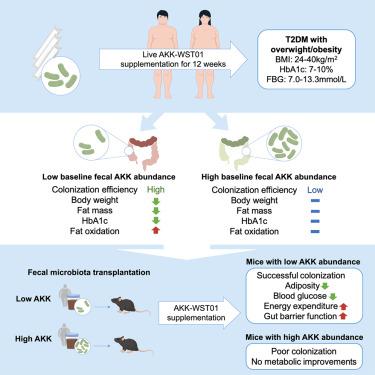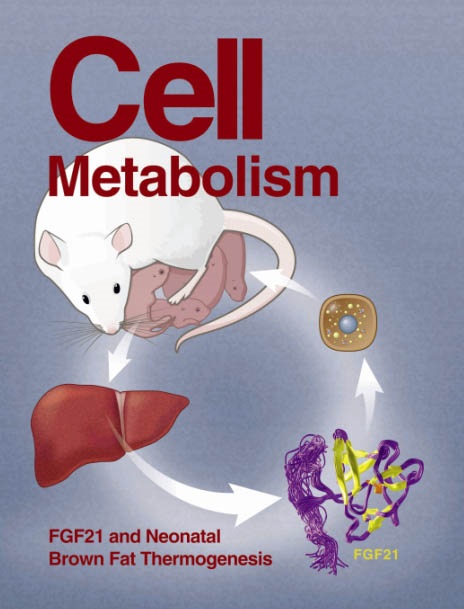在超重/肥胖2型糖尿病患者中补充嗜粘蛋白阿克曼氏菌:疗效取决于其在肠道中的基线水平
IF 27.7
1区 生物学
Q1 CELL BIOLOGY
引用次数: 0
摘要
嗜muciniphila是一种治疗肥胖和2型糖尿病(T2D)的有希望的靶点,但人类研究有限。我们进行了一项为期12周的随机、双盲、安慰剂对照试验,涉及58名超重或肥胖T2D患者,他们接受嗜粘杆菌(AKK-WST01)或安慰剂治疗,并接受常规生活方式指导。两组体重和糖化血红蛋白(HbA1c)均下降,组间无显著差异。在低基线嗜粘单胞杆菌的参与者中,AKK-WST01补充剂显示出高定植效率和显著降低体重、脂肪质量和HbA1c,这在安慰剂组中没有发现。然而,AKK-WST01补充显示,在高基线嗜粘杆菌患者中,定植不良,没有显著的临床改善。这些发现在无菌小鼠接受含有低或高嗜粘单胞杆菌的粪便中得到证实。我们的研究表明,补充嗜粘杆菌的代谢益处可能取决于其肠道基线水平,这支持了肠道微生物群引导的益生菌补充的潜力。(ClinicalTrials.gov号码:NCT04797442)。本文章由计算机程序翻译,如有差异,请以英文原文为准。

Akkermansia muciniphila supplementation in patients with overweight/obese type 2 diabetes: Efficacy depends on its baseline levels in the gut
Akkermansia muciniphila is a promising target for managing obesity and type 2 diabetes (T2D), but human studies are limited. We conducted a 12-week randomized, double-blind, placebo-controlled trial involving 58 participants with overweight or obese T2D, who received A. muciniphila (AKK-WST01) or placebo, along with routine lifestyle guidance. Both groups showed decreases in body weight and glycated hemoglobin (HbA1c), without significant between-group differences. In participants with low baseline A. muciniphila, AKK-WST01 supplementation showed high colonization efficiency and significant reductions in body weight, fat mass, and HbA1c, which were not found in the placebo group. However, AKK-WST01 supplementation showed poor colonization and no significant clinical improvements in participants with high baseline A. muciniphila. These findings were verified in germ-free mice receiving feces with low or high A. muciniphila. Our study indicates that metabolic benefits of A. muciniphila supplementation could depend on its baseline intestinal levels, supporting the potential for gut microbiota-guided probiotic supplementation. (ClinicalTrials.gov number, NCT04797442).
求助全文
通过发布文献求助,成功后即可免费获取论文全文。
去求助
来源期刊

Cell metabolism
生物-内分泌学与代谢
CiteScore
48.60
自引率
1.40%
发文量
173
审稿时长
2.5 months
期刊介绍:
Cell Metabolism is a top research journal established in 2005 that focuses on publishing original and impactful papers in the field of metabolic research.It covers a wide range of topics including diabetes, obesity, cardiovascular biology, aging and stress responses, circadian biology, and many others.
Cell Metabolism aims to contribute to the advancement of metabolic research by providing a platform for the publication and dissemination of high-quality research and thought-provoking articles.
 求助内容:
求助内容: 应助结果提醒方式:
应助结果提醒方式:


